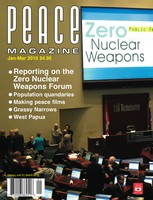
Peace Magazine Jan-Mar 2010, page 21. Some rights reserved.
Search for other articles by Hanna Newcombe here
By kitchen knives it would take four billion of us to kill the other four billion
In 1983 Ronald Reagan declared that “nuclear war cannot be won and must never be fought.” This maxim can develop into a taboo, much as in primitive tribes taboos are sanctioned by whatever gods or God there are, under divine punishment.
This is the thin guarantee under which the human race (all of us) still survive. In 1955, the Russell-Einstein Manifesto similarly proclaimed, “We appeal as human beings to human beings: Remember your humanity, and forget the rest.” Russell and Einstein called for complete nuclear disarmament.
A superpower or super-scientist statement cannot guarantee a taboo, nor can even a treaty. On the other side is the game of “Chicken” and the customary power politics of deterrence.
People who look for technological civilizations on other planets have derived an explanation for why we have never found any: that they all destroyed themselves when they attained sufficient weapons technology. We must prove them wrong for our planet Earth.
Superpower nuclear deterrence is based on the game of Chicken. Even though this is contrary to the theory of deterrence, nuclear strategy would send missiles driving at top speed against each other and not yielding, mutually destroying themselves.
It has almost happened several times e.g. the Cuban Missile Crisis of 1962, but there were then not yet enough H-bombs to end our species. Now there are enough H-bombs, of a more “advanced” design, plus the threat of nuclear winter (no food crops for several years, thus mass starvation). We must prove that this planet Earth can be perhaps the only technological civilization, the last and only one to survive.
Superpower deterrence is based on the game of Chicken. We must not play it any more.
We have reframed and kept the fragile taboo for some years now. There have also been several cases of near-accidental war by misunderstanding, including several confrontations (in spite of the end of the Cold War). Take the recent case of Russian intervention in the civil war in Georgia. Did the US threat cause rapid Russian withdrawal? No one knows. Or the 1956 Soviet intervention in Hungary; or in 1968 in Czechoslovakia; or US intervention in Nicaragua or Chile. Did deterrence operate? Was it threatened or merely implied? No one knows.
Nuclear deterrence by the game of Chicken must be abandoned. This can be done only if nuclear weapons themselves are abandoned. Only then will the nuclear taboo become real. The power struggle of states can perhaps be cured only by a well-functioning world federation, though there remains the possibility of civil wars.
But there is hope. Humans are not just natural killers. Though we are predators who kill other animals for food, cannibalism is banned by another taboo, as well as by laws. There are enough kitchen knives on the planet to kill all of us, but we don’t use them for that. It is repugnant to kill our conspecifics, except on the part of a few exceptional sadists and psychopaths. But one such person may become a state leader, in which case – look out! We humans also have a natural empathy for our cousins (other humans). So there is hope. We are all 99.99% genetically the same, at least each others’ 55th cousins. Women, as child-bearers, have more reluctance to kill those cousins, but exceptions exist. In bayonet training, new soldiers have to be strictly trained to kill with bayonets, even to turn them to widen the wound. There is a natural resistance. Of course, it is easier to kill en masse people whom we don’t even see, rather than one by one personally. By kitchen knives it would take four billion of us to kill the other four billion, many of whom are family members. By nature, we do not do this, though the philosopher Hobbes postulated an original condition in nature of “war of all against all” in which life was “nasty, brutish and short.” Society was organized to prevent this. But most anthropologists think that family-based tribes and states had existed in nature before this. Even animals do not usually kill their own kind.
We may not be perfect, but we are not wholly evil. So I repeat, there is hope. We can even practice nonviolent resistance against our oppression; see many examples cited by Gene Sharp.1
We also have what is called the “theory of mind” whereby we naturally infer that other people have a mind like ours. This makes it more difficult to kill them. The Golden Rule, expressed by all religions, says so.
Hanna Newcombe, O.C. is a peace researcher,. activist, and retired chemist. She lives in Hamilton.
1 Gene Sharp’s latest work, Waging Nonviolent Struggle: 20th Century Practice and 21st Century Potential was published in June, 2005. It builds on his earlier written works by documenting case studies where non-violent action has been applied, and the lessons learned from those applications, and contains unprecedented information on strategically planning nonviolent struggle to make it more effective.

Peace Magazine Jan-Mar 2010, page 21. Some rights reserved.
Search for other articles by Hanna Newcombe here